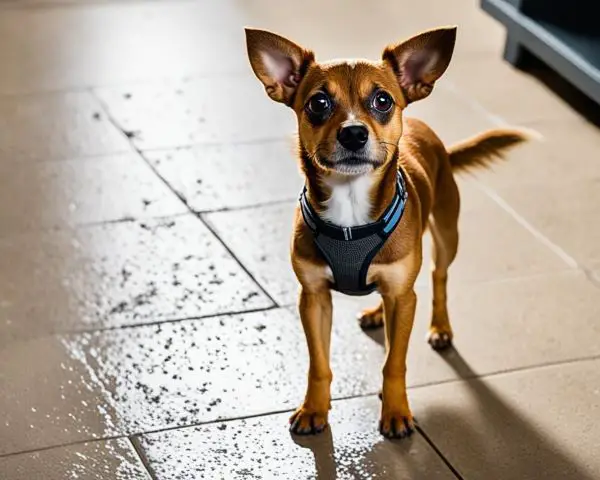Does your dog experience anxiety that leads to peeing accidents? If so, you're not alone. Many dog owners struggle with this issue, wondering how they can help their furry friends overcome their anxiety and prevent these unwanted accidents.
But fear not, because in this article, we will provide you with quick and effective tips to manage dog peeing from anxiety and restore peace and comfort to your home.

Key Takeaways:
- Understanding the root causes of dog anxiety is crucial in addressing peeing accidents.
- Identifying triggers that lead to anxious urination can help you create a more supportive environment for your dog.
- Creating a calm and soothing space for your dog through the use of pheromone diffusers and consistent routines can alleviate anxiety.
- Positive reinforcement training can replace anxious behaviors with more desirable ones, reducing peeing incidents.
- Regular exercise and mental stimulation play a vital role in managing dog anxiety and preventing urination from stress.
Now let's dive into these strategies in detail and equip you with the knowledge to help your dog overcome anxiety-induced peeing. Let's get started!
Understanding Dog Anxiety
Dog anxiety is a common issue that can have various manifestations, including urination problems. Many dogs exhibit anxiety-induced urination, also known as dog anxiety peeing or canine anxiety urination. This behavior occurs when a dog experiences stress or fear, causing them to lose control over their bladder.
Signs of anxiety in dogs can vary, but some common indicators include trembling, panting, pacing, excessive barking, destructive behavior, and, of course, urination. Dogs who pee from stress may do so indoors or in inappropriate places, even if they are otherwise well-trained. Understanding the underlying causes of anxiety-induced dog urination is essential to address the issue effectively.
It's important to note that anxiety-induced dog urination is not a deliberate or conscious action. Instead, it is a physical response to the overwhelming emotions experienced by the dog. When a dog feels anxious or stressed, their body releases hormones that can affect their bladder control, leading to involuntary urination.
"Anxiety-induced dog urination is a natural response to stress and fear. By identifying the triggers and implementing effective strategies, we can help our furry friends lead happier and more relaxed lives."
To better understand dog anxiety peeing, we have created a table outlining the common signs and causes of anxiety-induced urination:
| Signs of Anxiety-Induced Urination | Causes |
|---|---|
| Indoor urination or accidents | Separation anxiety |
| Urination during loud noises or storms | Noise phobia |
| Urination when meeting new people or animals | Social anxiety |
| Urination during vet visits | Fear of medical procedures or unfamiliar environments |
| Frequent urination when left alone | Generalized anxiety |
Understanding the triggers and causes of anxiety-induced dog urination is crucial in addressing the issue effectively. By identifying these triggers, dog owners can take appropriate steps to manage and reduce their dog's anxiety, ultimately helping them overcome the problem of canine anxiety urination.
Next, we will explore ways to identify the triggers of anxiety-induced urination and create a calm environment that promotes better well-being for our furry companions.
Identifying Triggers for Anxiety-Induced Urination
When dealing with a dog peeing from anxiety, it's crucial to identify the specific triggers that may be causing this behavior. By recognizing these triggers, you can take proactive steps to manage and mitigate situations that lead to anxious urination.
Every dog is unique, and different factors can contribute to anxiety-induced dog urination. Here are some common triggers to watch out for:
- Separation: Dogs who experience separation anxiety may urinate when left alone for extended periods. This behavior can indicate distress and a fear of being separated from their owner.
- Loud Noises: Thunderstorms, fireworks, or other loud noises can create anxiety in dogs, leading to urination as a response to fear and stress.
- Changes in Routine: Dogs are creatures of habit, and sudden changes in their daily routine, such as a new schedule or environment, can trigger anxiety and result in urination issues.
- Social Situations: Some dogs may feel overwhelmed or anxious in social situations, such as encountering unfamiliar people or other animals. This can lead to urination as a response to stress.
- Previous Trauma: Dogs who have experienced past traumas, such as abuse or neglect, may be more prone to anxiety-induced urination when faced with similar triggers that remind them of their past experiences.
By identifying the triggers that cause your dog to pee from anxiety, you can take steps to address these situations and help your furry friend feel more comfortable and secure.
"Understanding the triggers for anxiety-induced urination is the key to managing this behavior effectively and providing the necessary support to your anxious dog."
Throughout the next sections, we will explore various strategies to manage and address dog peeing from anxiety, focusing on creating a calm environment, positive reinforcement training, exercise, consulting with a veterinarian, behavior modification techniques, and prevention of reinforcement. With a comprehensive approach, you can help your dog overcome anxiety-related urination and improve their overall well-being.
| Triggers | Description |
|---|---|
| Separation | Dogs experiencing separation anxiety may urinate when left alone for extended periods. |
| Loud Noises | Thunderstorms, fireworks, or other loud noises can create anxiety in dogs, leading to urination as a response to fear and stress. |
| Changes in Routine | Sudden changes in a dog's daily routine can trigger anxiety and result in urination issues. |
| Social Situations | Dogs may feel overwhelmed or anxious in social situations, leading to urination as a response to stress. |
| Previous Trauma | Dogs with past traumas may be more prone to anxiety-induced urination when faced with similar triggers. |
Creating a Calm Environment
Dogs suffering from anxiety require a calm and soothing environment to help alleviate their stress and reduce instances of urination due to anxiety. By implementing the following strategies, you can create a safe space that promotes relaxation and eases your dog's anxiety:
- Designate a safe space: Provide your dog with a dedicated area where they can retreat when feeling overwhelmed. This can be a quiet room or a comfortable crate equipped with their favorite blankets and toys. Having a designated safe space gives your dog a sense of security.
- Utilize pheromone diffusers: Pheromone diffusers, such as Adaptil, release synthetic calming pheromones that mimic those naturally produced by mother dogs to soothe their puppies. These diffusers can help create a relaxing atmosphere and reduce anxiety-related behaviors.
- Establish a consistent daily routine: Dogs thrive on routine, and having a predictable schedule can help reduce their anxiety levels. Establish fixed times for feeding, exercise, and play, providing a sense of stability and comfort for your furry friend.
By implementing these strategies, you can create an environment that promotes calmness and helps manage your dog's anxiety, ultimately reducing instances of urination caused by stress.
Creating a calm environment is essential in managing dog anxiety and reducing urination problems stemming from anxiety. By providing a safe space, utilizing pheromone diffusers, and establishing a consistent routine, you can help your dog find comfort and relaxation. Remember, a calm environment contributes to your dog's overall well-being and is an important factor in their journey to overcome anxiety.
Positive Reinforcement Training
Positive reinforcement training is a highly effective approach to address dog urination stemming from anxiety. By using positive techniques, you can replace the unwanted behavior with more desirable actions, helping your furry friend overcome their anxiety and regain control. Here are some key strategies to implement:
- Identify desirable behaviors: Take the time to observe your dog and identify behaviors that you would prefer to see instead of anxious urination. These can include sitting calmly, relaxing in their designated safe space, or engaging in a favorite toy or game.
- Reward and reinforce: When you notice your dog displaying one of these desirable behaviors, provide immediate positive reinforcement. This can be in the form of praise, treats, or a favorite toy. Make sure the reward is something your dog finds highly motivating.
- Consistency is key: To effectively change behavior, consistency is crucial. Ensure that everyone in your household follows the same positive reinforcement techniques, using the same rewards and consistently reinforcing the desired actions.
- Timing is important: Timing is essential when using positive reinforcement. Make sure to reward your dog immediately after they display the desired behavior. This will help them make a connection between the action and the reward.
- Gradual progression: As your dog becomes more comfortable and displays the desired behavior consistently, gradually increase the difficulty level. For example, if your dog remains calm for longer periods, reward them with a higher value treat or extend the duration of the reward.
Positive reinforcement training not only helps your dog overcome anxiety-induced urination but also strengthens your bond and enhances their overall well-being.
Remember, patience and positivity are key when using positive reinforcement techniques. Celebrate even the smallest victories and be consistent in your approach. With time and dedication, you can help your dog overcome anxiety-induced urination behavior.
Exercise and Mental Stimulation
Regular exercise and mental stimulation are essential for managing dog anxiety and preventing urination problems caused by stress. Providing your dog with opportunities to engage in physical activity and brain-engaging games can significantly reduce their anxiety levels and promote overall well-being.
Exercise helps release endorphins, which are natural mood boosters, and helps reduce stress levels in dogs. It also promotes better sleep, which can further contribute to a calmer and more relaxed state of mind.
Mental stimulation keeps your dog's brain occupied and prevents boredom, which is often a trigger for anxiety. Engaging your dog's mind with interactive toys, puzzles, and training exercises can redirect their focus away from anxious thoughts and behaviors.
Remember to tailor the exercise routine to your dog's age, breed, and physical abilities. Some dogs require more vigorous exercise, such as running or playing fetch, while others may enjoy low-impact activities like swimming or walking. Find activities that your dog enjoys and incorporate them into their daily routine.
"Regular exercise and mental stimulation are crucial in managing anxiety and preventing anxious urination in dogs."
Here are some ways to incorporate exercise and mental stimulation into your dog's routine:
- Take your dog for daily walks or runs in a safe and comfortable environment. Explore new areas to keep things interesting, but be mindful of any potential triggers that may cause anxiety.
- Engage in interactive play sessions, such as tug-of-war or hide-and-seek, to stimulate your dog's mind and body.
- Invest in puzzle toys or treat-dispensing toys that require your dog to work for their reward. This will keep them occupied and mentally stimulated.
- Enroll your dog in training classes or participate in agility courses. This provides both physical exercise and mental challenges.
Remember to gradually increase the intensity and duration of exercise to avoid overwhelming your dog. Start with shorter sessions and gradually build up to longer periods as your dog's fitness level improves. Additionally, always provide your dog with plenty of water and take breaks when needed to prevent exhaustion.
| Type of Activity | Benefits |
|---|---|
| Walking or Running | - Physical exercise - Mental stimulation - Bonding time with your dog |
| Interactive Play | - Mental stimulation - Relationship-building - Channeling energy into positive outlets |
| Puzzle Toys | - Mental stimulation - Problem-solving skills - Encourages independent play |
| Training Classes | - Mental stimulation - Socialization - Learning new skills and commands |
By prioritizing exercise and mental stimulation, you can provide your dog with the outlets they need to release excess energy, reduce anxiety, and prevent urination problems caused by stress. Remember to consult with a veterinarian if your dog's anxiety persists or if you have any concerns about their physical or mental well-being.
Consulting with a Veterinarian
If your dog is exhibiting significant anxiety-related urination, it is essential to seek advice from a veterinarian. A veterinarian plays a crucial role in helping to determine the underlying causes of your dog's anxiety and recommending appropriate treatment options.
During a consultation with a veterinarian, they will carefully assess your dog's behavior and medical history to gain a comprehensive understanding of their anxiety. They may ask questions about specific triggers or situations that lead to urination episodes. Additionally, they may need to conduct further tests or examinations to rule out any underlying medical conditions that could contribute to the anxiety and urination problem.
Based on their evaluation, the veterinarian will provide tailored recommendations to manage your dog's anxiety and address the urination issue. This may include a combination of behavior modification techniques, environmental adjustments, and potentially medication or supplements.
"A veterinarian's expertise is invaluable in identifying the root causes of your dog's anxiety and developing a treatment plan to alleviate their stress and minimize urination problems." - Dr. Emily Johnson, DVM
Remember, every dog is unique, and what works for one may not work for another. A veterinarian will provide personalized guidance to address your dog's specific needs. Their extensive knowledge and experience in canine behavior and health make them the ideal partner in managing anxiety-induced urination.
| Treatment Options | Description |
|---|---|
| Behavior Modification Techniques | These techniques focus on changing your dog's response and behavior through consistent training methods and positive reinforcement. |
| Environmental Adjustments | Creating a calm and stress-free environment for your dog by establishing a safe space, using pheromone diffusers, and maintaining a consistent daily routine. |
| Medication or Supplements | In some cases, veterinarians may prescribe medication or recommend natural supplements to help manage your dog's anxiety and reduce urination problems. |
Pet Owner Success Story
"When my dog, Max, started urinating from anxiety, I was at a loss as to what to do. After consulting with a veterinarian, I implemented behavior modification techniques and made adjustments to his environment. With consistent training and the veterinarian's guidance, Max's anxiety-induced urination gradually decreased, and he became a calmer and happier dog."
If you notice your dog peeing from anxiety, don't hesitate to reach out to a veterinarian for professional advice. They will be able to provide the help and support you need to address your dog's anxiety and improve their overall well-being.
Medication and Supplements
In some cases, when dealing with a dog experiencing anxiety-induced urination, medication or supplements may be necessary to manage the anxiety and alleviate the urination issues. It is important to remember that medication should only be considered after consulting with a veterinarian.
There are various pharmaceutical and natural options available to help dogs with anxiety. Your veterinarian will assess your dog's specific needs and prescribe the appropriate medication or recommend suitable supplements. These medications and supplements can assist in reducing anxiety levels, promoting relaxation, and improving overall well-being.
"The use of medication and supplements can provide significant relief for dogs dealing with anxiety-induced urination. However, it is crucial to work closely with your veterinarian to ensure the safety and efficacy of any treatment options."
Pharmaceutical options for anxiety in dogs may include anti-anxiety medications such as selective serotonin reuptake inhibitors (SSRIs) or tricyclic antidepressants (TCAs). These medications can help regulate neurotransmitters in the brain and reduce anxiety symptoms.
Supplements, on the other hand, offer natural alternatives that can help promote calmness in dogs. Popular supplements include chamomile, valerian root, and CBD oil, among others. It's important to note that while natural supplements can be effective for some dogs, they may not work for every individual, which is why consultation with a veterinarian is crucial.
When to Consider Medication or Supplements
The decision to use medication or supplements for your dog's anxiety-induced urination should be based on the severity of their symptoms, the impact on their quality of life, and the effectiveness of other management strategies. It's essential to work closely with your veterinarian to determine the appropriate timing and dosage.
Medication or supplements should not be the first line of treatment. It is important to explore other strategies such as behavior modification techniques, creating a calm environment, and positive reinforcement training before considering medication or supplements.
Behavior Modification Techniques
When it comes to managing dog anxiety and addressing urination problems, behavior modification techniques can be highly effective. These techniques focus on modifying your dog's behavior and response to anxiety triggers, ultimately helping them overcome their fear and reducing the likelihood of anxious urination.
One popular behavior modification technique is counterconditioning. This involves pairing the anxiety-inducing trigger with something positive and rewarding for your dog. For example, if your dog gets anxious during thunderstorms, you can create a positive association by offering treats or engaging in fun activities whenever a storm occurs. Over time, this can help change your dog's emotional response to thunderstorms and alleviate anxiety-induced urination.
Desensitization is another valuable technique for managing dog anxiety. It involves gradually exposing your dog to the trigger in a controlled and safe environment. By starting with low levels of exposure and gradually increasing it over time, you can help your dog build tolerance and reduce their anxiety. This technique is particularly effective for dogs who experience anxiety in specific situations, such as separation anxiety or fear of loud noises.
Another technique to consider is the use of calming aids, such as pheromone diffusers or anxiety wraps. These aids can help create a sense of calmness and security for your dog, reducing their anxiety levels and mitigating the likelihood of urination problems.
"Behavior modification techniques such as counterconditioning and desensitization can be powerful tools in managing dog anxiety and addressing urination problems caused by anxiety." - Dr. Emma Johnson, DVM
Remember that behavior modification techniques require time, patience, and consistency. It's important to consult with a professional dog trainer or behaviorist who can guide you through the process and provide expert advice tailored to your dog's specific needs.
| Behavior Modification Techniques | Benefits |
|---|---|
| Counterconditioning | - Creates positive associations - Helps change emotional response |
| Desensitization | - Gradually builds tolerance - Reduces anxiety levels |
| Calming aids | - Provides sense of calmness - Reduces anxiety and urination problems |
Preventing Reinforcement of Anxious Behavior
When dealing with a dog experiencing anxiety, it's crucial to prevent inadvertently reinforcing their anxious behaviors. By implementing techniques that promote calm behaviors and discouraging anxious ones, you can help your dog overcome their anxiety and reduce urination issues.
- Ignore anxious behaviors: If your dog displays anxious behaviors such as excessive panting, pacing, or trembling, it's essential to avoid giving them attention or comfort. Ignoring these behaviors prevents reinforcement and encourages your dog to seek alternative, more relaxed behaviors.
- Reward relaxed behavior: Instead of focusing on your dog's anxious actions, make a conscious effort to reward them when they exhibit calm and relaxed behaviors. This can be achieved through treats, praise, or gentle petting.
By redirecting your focus towards encouraging calm behavior and providing positive reinforcement, you can gradually help your dog develop healthier responses to anxiety-inducing situations.
"Redirecting your focus towards encouraging calm behavior and providing positive reinforcement can help your dog develop healthier responses to anxiety-inducing situations."
In addition to these techniques, consistency and patience are key in preventing the reinforcement of anxious behavior. By maintaining a consistent approach and understanding that progress may take time, you set the foundation for long-term success in managing your dog's anxiety and urination issues.
| Technique | Benefits |
|---|---|
| Ignore anxious behaviors | - Discourages reinforcement of anxious behaviors - Encourages the exploration of alternative, relaxed behaviors |
| Reward relaxed behavior | - Reinforces calm and relaxed behaviors - Encourages positive associations with calmness |
| Consistency and patience | - Sets a strong foundation for long-term success - Allows time for progress and behavior modification |
By implementing these strategies and techniques, you can help your dog overcome anxiety-related urination and promote their overall well-being.
Patience and Consistency
Dealing with anxiety-induced urination in dogs can be a challenging and time-consuming process. It requires patience and consistency to address this behavior effectively. By remaining dedicated to your training efforts, you can help your dog overcome their anxiety and reduce urination due to stress.
When it comes to managing anxiety-induced urination, consistency is key. Stick to a consistent routine, including regular feeding, exercise, and potty breaks. Establishing a predictable schedule can help your dog feel more secure and less anxious, ultimately reducing their urge to urinate from anxiety.
It's important to remember that progress may take time, and setbacks are possible. Be patient with your dog and understand that overcoming anxiety is a gradual process. Stay committed to implementing positive reinforcement techniques and avoiding reinforcement of anxious behaviors. Consistency in your approach will provide structure and comfort to your dog, helping to alleviate their anxiety-related urination.
One important aspect of patience and consistency is to avoid punishment. Reprimanding or scolding your dog for urinating due to anxiety can worsen their stress and prolong the issue. Instead, focus on positive reinforcement training, rewarding good behavior, and providing a safe and calming environment for your pet.
During the training process, it's essential to manage setbacks with understanding and a calm demeanor. If your dog has an accident due to anxiety, resist the urge to react negatively. Instead, clean up the mess calmly and redirect your attention to reinforcing positive behaviors. It's crucial to remain patient and consistent throughout the entire training journey to achieve lasting results.
Remember, every dog is unique, and what works for one may not work for another. Be open to adjusting your approach and seeking professional guidance if needed. By staying patient and consistent in your efforts, you can help your dog overcome their anxiety-induced urination and create a happier and more comfortable environment for both of you.
| Benefits of Patience and Consistency |
|---|
| Stress Reduction: Patience and consistency can help reduce your dog's overall stress levels, which can lead to a decrease in anxiety-induced urination. |
| Building Trust: By consistently providing a calm and safe environment, your dog will learn to trust you and feel more secure, reducing their anxiety and the urge to urinate. |
| Establishing Routine: A consistent routine will help your dog feel more comfortable and less anxious, as they will come to anticipate and rely on regular activities and schedules. |
| Confidence Building: Consistent positive reinforcement training can help boost your dog's confidence and increase their ability to cope with anxiety-triggering situations, leading to a reduction in urination from stress. |
Conclusion
In conclusion, effectively managing dog peeing from anxiety requires a comprehensive approach that addresses the root causes of anxiety and provides the necessary support for your furry friend.
To begin, it is crucial to understand the triggers that lead to anxious urination. By identifying these triggers, you can take proactive steps to minimize their impact and create a calm environment for your dog.
In addition, positive reinforcement training and regular exercise are essential tools in helping your dog cope with anxiety. By rewarding desired behaviors and providing mental and physical stimulation, you can help redirect their focus away from anxious urination.
Consulting with a veterinarian is crucial, as they can provide expert guidance and recommend suitable treatment options. In some cases, medication or supplements may be necessary to alleviate anxiety and manage urination issues.
Lastly, behavior modification techniques can play a significant role in reducing anxiety and addressing urination problems. By implementing consistent training methods and avoiding reinforcement of anxious behaviors, you can help your dog overcome anxiety-related urination.
With patience, understanding, and the implementation of these strategies, you can support your beloved canine companion in overcoming anxiety-related peeing and improve their overall well-being.
FAQ
Can anxiety cause a dog to urinate?
Yes, anxiety can cause dogs to urinate. When dogs feel stressed or anxious, they may involuntarily release urine as a response. This behavior is known as anxiety-induced urination.
How can I identify if my dog is experiencing anxiety-induced urination?
Signs of anxiety-induced urination in dogs may include frequent accidents indoors, submissive urination when approached or greeted, and urinating in unusual locations. It's important to observe your dog's behavior and consult with a veterinarian to rule out any underlying health issues.
What are some common triggers for anxiety-induced urination in dogs?
Dogs may urinate from anxiety due to triggers such as separation from their owners, loud noises (thunderstorms, fireworks), unfamiliar environments, or unfamiliar people or animals. Identifying these triggers can help you manage your dog's anxiety and minimize urination incidents.
How can I create a calm environment for my anxious dog?
Creating a calm environment for your dog involves providing a designated safe space, using pheromone diffusers or calming aids, maintaining a consistent daily routine, and minimizing exposure to stressful stimuli. These measures can help reduce anxiety levels and decrease the likelihood of urination issues.
Can positive reinforcement training help prevent anxious urination?
Yes, positive reinforcement training techniques can be effective in addressing anxious urination. By rewarding desired behaviors and redirecting anxious behavior to more appropriate actions, you can help your dog overcome their anxiety and reduce urination problems.
How can exercise and mental stimulation alleviate anxiety-related urination?
Regular exercise and mental stimulation are crucial for managing anxiety in dogs. Engaging in physical activity and providing brain-engaging games helps to release excess energy, reduce stress levels, and promote overall relaxation, which can lessen urination from anxiety.
When should I consult with a veterinarian about my dog's anxiety-related urination?
It is advisable to consult with a veterinarian if your dog's anxiety-induced urination is severe, persistent, or significantly affecting their quality of life. A veterinarian can help identify the underlying causes of anxiety and recommend appropriate treatment options tailored to your dog's specific needs.
Are there medications or supplements that can help manage anxiety-induced urination?
In some cases, medication or supplements may be prescribed by a veterinarian to help manage anxiety and related urination problems. These may include anti-anxiety medications, herbal remedies, or natural supplements. It's important to consult with a professional to determine the most suitable options for your dog.
How can behavior modification techniques assist in reducing anxiety-related urination?
Behavior modification techniques such as counterconditioning and desensitization can help to reduce anxiety and address urination problems. These techniques involve gradually exposing your dog to anxiety triggers in a controlled and positive manner to help them develop new, relaxed associations.
What can I do to prevent reinforcement of anxious behavior in my dog?
To prevent reinforcement of anxious behaviors, it's essential to avoid rewarding or comforting your dog during moments of anxiety. Instead, focus on rewarding calm and relaxed behavior. In addition, it's important to maintain a consistent and predictable environment to reduce stress and encourage calmness.
How long does it take to manage anxiety-induced urination in dogs?
Managing anxiety-induced urination in dogs often requires patience and consistency. The length of time may vary depending on the severity of the anxiety and the effectiveness of the chosen strategies. It's important to remain persistent and adapt techniques as needed while monitoring your dog's progress.
Read my latest posts here:
- Golden Cavapoo Guide: Care, Training & TipsAs a devoted dog lover, I can't help but feel a sense of joy and fulfillment whenever I see a wagging tail and a pair of eager eyes looking up at me. Dogs have this incredible ability to bring light, love, and companionship into our lives, and one particular breed that has stolen my heart… Read more: Golden Cavapoo Guide: Care, Training & Tips
- Adopt a Rescue Cavapoo Today – Find Your Buddy!Imagine coming home to a wagging tail, a warm snuggle buddy, and unconditional love. That's the joy of having a furry friend by your side. But what if I told you that you could not only experience the purest form of companionship but also change a life in the process? By adopting a rescue cavapoo,… Read more: Adopt a Rescue Cavapoo Today – Find Your Buddy!
- Black Cavapoo Puppies: Your Adorable GuideImagine coming home to a furry ball of excitement, wagging its tail and eagerly waiting for your return. Picture the joy of cuddling up on the sofa with a playful companion who brings laughter and warmth to your life. This is the magic that black Cavapoo puppies can bring to your world. Whether you're a… Read more: Black Cavapoo Puppies: Your Adorable Guide
- Straight Hair Cavapoo Traits and Care GuideHave you ever dreamed of having a furry companion who is not only adorable but also hypoallergenic? Someone who will bring joy and love into your life without triggering pesky allergies or leaving a trail of fur behind? Well, let me introduce you to the straight hair Cavapoo, the perfect blend of cuteness and allergy-friendly… Read more: Straight Hair Cavapoo Traits and Care Guide
- Managing Dog Peeing from Anxiety - Quick TipsDoes your dog experience anxiety that leads to peeing accidents? If so, you're not alone. Many dog owners struggle with this issue, wondering how they can help their furry friends overcome their anxiety and prevent these unwanted accidents. But fear not, because in this article, we will provide you with quick and effective tips to… Read more: Managing Dog Peeing from Anxiety - Quick Tips
- Anti-Pull Dog Leash: Enjoy Tangle-Free WalksAre you tired of your dog constantly pulling and tugging during walks, making the experience more stressful than enjoyable? Do you wish there was a solution to make your walks together more peaceful and hassle-free? Say goodbye to those tangled leashes and strained arms because we have the answer! Introducing the revolutionary anti-pull dog leash,… Read more: Anti-Pull Dog Leash: Enjoy Tangle-Free Walks
- Dog Ate Aspirin? Immediate Steps to Take NowAs dog owners, we prioritize the well-being of our furry companions. But what happens when your beloved pet accidentally ingests aspirin? Do you know what immediate steps to take? Are you aware of the potential harm it can cause? Let's dive into this critical topic and learn how to safeguard your dog's health. Accidental consumption… Read more: Dog Ate Aspirin? Immediate Steps to Take Now
- Understanding Dog Aggressive Behavior with PeersDo you ever wonder why some dogs exhibit aggressive behavior towards their fellow canines? Is aggression towards other dogs a common problem or just a result of poor training? In this section, we will delve into the complexities of dog aggressive behavior towards other dogs and explore effective training methods to address this issue. By… Read more: Understanding Dog Aggressive Behavior with Peers
- Old English Bulldog vs. English Bulldog DifferencesWhen it comes to bulldogs, most people are familiar with the popular English Bulldog. However, there is another breed that often gets overlooked - the Old English Bulldog. These two breeds may share a similar name, but they have distinct differences that set them apart. So, what exactly are the key differences between the Old… Read more: Old English Bulldog vs. English Bulldog Differences
- Bulldog Farts: Causes and How to Reduce ThemDo you own an adorable bulldog but find yourself constantly battling their smelly gas? Are you tired of searching for effective remedies to combat the flatulence in your furry friend? Look no further! In this article, we will dive into the causes of bulldog farts and provide you with essential tips to reduce them and… Read more: Bulldog Farts: Causes and How to Reduce Them
- Bloodhound and Lab Mix Puppies: Adorable CompanionsAre you looking for an adorable companion that combines the best traits of two popular breeds? Meet the Bloodhound and Lab mix puppies, the lovable designer dogs that are capturing hearts everywhere. These unique crossbreeds are not only incredibly cute but also offer a variety of benefits that make them stand out from purebred dogs.… Read more: Bloodhound and Lab Mix Puppies: Adorable Companions
- AKC Bulldog Colors Guide - Identify Your PupHave you ever wondered why bulldogs come in such a diverse range of colors? From brindle and fawn to white and black, the coat colors of bulldogs are a fascinating subject. But how well do you know the official American Kennel Club (AKC) bulldog colors and standards? Are you confident in identifying the color genetics… Read more: AKC Bulldog Colors Guide - Identify Your Pup
- How many nipples does a dog haveHave you ever wondered how many nipples a dog has and what their purpose is? We will explore the anatomy of a dog's nipples, including how many nipples female and male dogs have. We will also discuss common nipple problems in dogs and how to tell if a dog's nipples are healthy. If you're curious… Read more: How many nipples does a dog have
- Best brush for a CavapooWhen you first bring your adorable little Cavapoo home, you’ll still be gathering all the things you need to take the best care of him or her. This post has been updated on 27th Feb 2024. One of the best brushes I’ve found is the Big G Slicker Brush by Chris Christensen. The longer pins… Read more: Best brush for a Cavapoo
- Meet the Unique Cavapoo with Blue Eyes - A Rare BeautyAs a professional journalist, I've had the pleasure of writing about various dog breeds, but the Cavapoo with blue eyes stands out as a true rarity. This captivating canine boasts striking blue eyes that add to its already unique charm. The Cavapoo breed with blue eyes is a sight to behold, with a playful personality… Read more: Meet the Unique Cavapoo with Blue Eyes - A Rare Beauty
- Comparing Breeds: Poochon vs Cavapoo - A Detailed InsightWhen it comes to selecting a new pet, many people find themselves deciding between the Poochon and Cavapoo breeds. While both are popular for their hypoallergenic qualities and suitability as family pets, there are distinct differences between the two that potential owners should consider. In this article, we will provide a detailed comparison of the… Read more: Comparing Breeds: Poochon vs Cavapoo - A Detailed Insight
- Adorable Newborn Cavapoo Puppies: A Must-Have CompanionGreetings! As a professional copywriting journalist, I am delighted to explore with you the irresistible charm of newborn Cavapoo puppies in this article. If you're a dog lover looking for a furry friend, you'll want to know how Cavapoo puppies make the perfect companions. Let's discover the joys of welcoming these adorable little bundles of… Read more: Adorable Newborn Cavapoo Puppies: A Must-Have Companion
- Meet the Adorable Ginger Cavapoo: Your Perfect CompanionIf you are in search of the ultimate companion that is both affectionate and adaptive, look no further than the ginger Cavapoo. These charming little dogs are a crossbreed between a Cavalier King Charles Spaniel and a Poodle, resulting in a lovable combination of traits that make them the perfect addition to any family. One… Read more: Meet the Adorable Ginger Cavapoo: Your Perfect Companion
- Your Guide to Adorable Ruby Cavapoo PuppiesWelcome to my comprehensive guide on ruby Cavapoo puppies! As a professional copywriting journalist, I have extensive experience researching and writing about different dog breeds. In this guide, we will explore everything you need to know about the adorable ruby Cavapoo, including their breed information, care tips, and why they make a perfect addition to… Read more: Your Guide to Adorable Ruby Cavapoo Puppies
- Overcoming Challenges: Why I Hate My Cavapoo & How To Love ItAs a Cavapoo owner, I know firsthand the challenges and frustrations that come with having this adorable breed as a furry companion. Despite their cute appearance and affectionate nature, Cavapoos can sometimes exhibit problem behaviors that lead to feelings of dislike and even resentment towards them. If you've ever found yourself saying "I hate my… Read more: Overcoming Challenges: Why I Hate My Cavapoo & How To Love It
- Unbiased Jonas Cavapoo Puppies Reviews: Happy Pet Parents Speak OutWhy Cavapoo Puppies are Highly Sought After As a professional copywriting journalist, I have had the opportunity to interact with many dog breeds. However, Cavapoos stand out as one of the most sought after breeds. But why? Cavapoo puppies are a perfect blend of the adorable, fun-loving, and affectionate attributes of a Cavalier King Charles… Read more: Unbiased Jonas Cavapoo Puppies Reviews: Happy Pet Parents Speak Out
- Explore Adorable River's Edge Cavapoos: Your Perfect Family PetAre you looking for a furry companion to bring joy and love into your family? If you're based in the US then you could take a look at River's Edge Cavapoos. Cavapoos are adorable puppies which are the perfect mix of Cavalier King Charles Spaniel and Poodle, resulting in a loving and gentle temperament that… Read more: Explore Adorable River's Edge Cavapoos: Your Perfect Family Pet
- Unveiling the Timeline: How Long for Cavapoo Hair to Grow BackAs a professional copywriting journalist, I often come across concerned Cavapoo owners wondering how long it will take for their pet's hair to regrow. The answer is not straightforward since several factors come into play in determining the time it takes for Cavapoo hair growth. In this section, I will explore the timeline for Cavapoo… Read more: Unveiling the Timeline: How Long for Cavapoo Hair to Grow Back
- Enjoy Comfort & Warmth with Equafleece Cavapoo Sweaters!As the temperature drops, it's essential to keep our furry friends warm and comfortable. The Equafleece Cavapoo Sweaters are a perfect solution to keep your Cavapoo cozy during the winter months. Equafleece is a renowned brand that offers high-quality dog fleece, including customized clothing for specific breeds, shapes and sizes, including our beloved Cavapoos. Equafleece… Read more: Enjoy Comfort & Warmth with Equafleece Cavapoo Sweaters!
- Can Puppies Look Like Their Grandparents? Unravelling the Mystery!Have you ever noticed a striking resemblance between your new puppy and their grandparents? Perhaps they share the same colouring or have similar facial features? It's not uncommon for puppies to resemble their grandparents, and in this article, I will explore the fascinating topic of whether this is possible and why it happens. We will… Read more: Can Puppies Look Like Their Grandparents? Unravelling the Mystery!
- Does Dewormer Make Puppies Pee More? Find Out Now!As a puppy owner, you may have concerns about the effects of deworming medication on your furry friend. One common worry is whether dewormer makes puppies pee more frequently. It's understandable to have questions about such changes in your puppy's urinary habits and how they may affect their well-being. In this article, we will provide… Read more: Does Dewormer Make Puppies Pee More? Find Out Now!
- When Do Puppies Require Less Supervision? A Detailed Guide.As a new puppy owner, it's important to keep a close eye on your furry friend. Puppies are curious and energetic, which means they require constant supervision to stay safe. However, as your puppy grows and develops, they will start to become more independent and require less supervision. But when exactly do puppies require less… Read more: When Do Puppies Require Less Supervision? A Detailed Guide.
- Can Dogs Eat Croissants? Your Query Answered Simply.As a dog lover, I am always concerned about my furry friend's health and well-being. It is essential to be aware of what we offer our dogs, especially when it comes to food. One of the most common questions pet owners ask is, "Can dogs eat croissants?" Croissants are a popular pastry that many people… Read more: Can Dogs Eat Croissants? Your Query Answered Simply.
- Delicious Pastrami Dogs: A British Twist on a Classic FavouriteAs a professional copywriting journalist, I have seen many trends come and go in the food industry. However, one dish that has captured my attention lately is pastrami dogs. These gourmet hot dogs are a British twist on a classic American favourite, and they are taking the culinary world by storm. Picture a juicy hot… Read more: Delicious Pastrami Dogs: A British Twist on a Classic Favourite
- Discover the Lovable Beethoven Dog Breed - All You Need to KnowAre you looking for a loyal and affectionate companion? Look no further than the Beethoven dog breed. These gentle giants are known for their charming personality and playful nature, making them the perfect addition to any family. With their distinctive features and friendly temperament, the Beethoven dog breed has become a popular choice among dog… Read more: Discover the Lovable Beethoven Dog Breed - All You Need to Know
- Understanding Behaviour: Why Do Female Dogs Put Their Bum on You?As a dog owner, you may have experienced the curious behaviour of a female dog putting her bum on you. While it may seem odd or even embarrassing, it's important to understand that this behaviour is a form of canine communication and can reveal a lot about your furry friend's instincts and personality. In this… Read more: Understanding Behaviour: Why Do Female Dogs Put Their Bum on You?
- Answering: How Many Dentastix Can a Dog Have a Day?As a dog owner, I'm sure you want to do everything possible to keep your furry friend healthy and happy. This includes taking good care of their teeth, which is essential for their overall health and well-being. One popular dental treat for dogs is Dentastix, but you may be wondering how many Dentastix can a… Read more: Answering: How Many Dentastix Can a Dog Have a Day?
- An Unexpected Bond: When My Dog Licked My EyeAs a dog owner, I thought I'd seen it all. But one day, my furry friend surprised me in a way I never could have imagined – by licking my eye. At first, I was taken aback and worried about the potential health risks. But as I looked into my dog's adoring eyes, I couldn't… Read more: An Unexpected Bond: When My Dog Licked My Eye
- Is Blue Cheese Safe? - A Guide to Blue Cheese for DogsAs a dog owner, it's natural to want to share your food with your furry friend. However, it's important to be cautious about what you feed them, as not all human foods are safe for dogs. One food that often raises questions is blue cheese. While it can be a delicious addition to our meals,… Read more: Is Blue Cheese Safe? - A Guide to Blue Cheese for Dogs
- What is Raw Feeding Dogs? Discover the Benefits & Basics.Hello, fellow dog lovers! I am thrilled to share with you the fascinating world of raw feeding for dogs. You may have heard of it before, but what exactly is raw feeding? Raw feeding refers to the concept of feeding dogs a diet of raw and unprocessed foods that mimic what their ancestors would have… Read more: What is Raw Feeding Dogs? Discover the Benefits & Basics.
- Uncover the Charms of Brown Fluffy Dog Breeds Today!Welcome to the world of brown fluffy dog breeds! These adorable and affectionate canines have captured the hearts of people around the globe with their cute, fluffy appearance and friendly personalities. In this article, we will explore the different types of brown fluffy dogs, provide tips on their care, and answer frequently asked questions about… Read more: Uncover the Charms of Brown Fluffy Dog Breeds Today!
- Best Vacuum Cleaner for Dog Hair UKWhen I was young I spent a lot of time at my grandparents house and they had four Bernese Mountain Dogs. Between them they kept my nan busy with daily brushing and she also used a pretty heavy duty vacuum cleaner! Now my dog "Bean" isn't nearly as bad as the double coated Bernese but… Read more: Best Vacuum Cleaner for Dog Hair UK
- Is Raw Feeding Dogs More Expensive? Let's Compare Costs.Hello, fellow dog lovers! As a dog owner, I am always on the lookout for the best ways to keep our furry friends happy and healthy. One question that often comes up in discussions about pet nutrition is whether raw feeding dogs is more expensive than traditional diets? Yes, raw feeding can be more expensive… Read more: Is Raw Feeding Dogs More Expensive? Let's Compare Costs.
- Can Dogs Eat Watercress? Discover the Answer & Benefits.As a dog owner, I am always looking for ways to provide my furry friend with a balanced and nutritious diet. One food item that has caught my attention recently is watercress. But can dogs eat watercress? Is it safe for them? In this section, I will explore the safety considerations associated with feeding watercress… Read more: Can Dogs Eat Watercress? Discover the Answer & Benefits.
- My Dog Ate 10mg of Loratadine: What to Do & Prevention TipsAs a dog owner, it's essential to be aware of potential dangers that your pet may face. One such danger is the ingestion of medication meant for humans. One day, I discovered that my dog had eaten 10mg of loratadine, an antihistamine commonly used to treat allergies in humans. I panicked and was unsure of… Read more: My Dog Ate 10mg of Loratadine: What to Do & Prevention Tips
- Dog Ate a Wasp: Remedies & Vet TipsIt happens to the best of us - our curious canine companion decides to snack on something they shouldn't. If your dog has eaten a wasp, it's important to take immediate action to alleviate any discomfort or potential health risks they may experience. In this guide, we'll explore the symptoms of a dog eating a… Read more: Dog Ate a Wasp: Remedies & Vet Tips
- Why Does My Dog Pant in the Car? Understanding Your Pet's BehaviorHave you ever noticed your dog panting heavily during car rides? Don't worry, it's a common behaviour for dogs. However, excessive panting can indicate discomfort or anxiety, which can make car rides stressful for both you and your furry friend. It's essential to understand your pet to ensure their well-being during car rides. Dogs pant… Read more: Why Does My Dog Pant in the Car? Understanding Your Pet's Behavior
- Can Puppy Eat Salmon? – A Friendly Guide to Feeding PuppiesWelcome to our friendly guide on whether it is safe for a puppy to eat salmon. As a pet owner, you want to ensure that your furry friend is receiving the best possible nutrition to support their well-being. Salmon is a nutritious fish that provides several health benefits for dogs, but is it safe for… Read more: Can Puppy Eat Salmon? – A Friendly Guide to Feeding Puppies
- Vet Bed UKThanks for checking out my review of the PnH Veterinary Bedding. I recently purchased the Vet Bed Rectangle measuring 76cm x 50cm in the colour Grey. It came ready to use, with the selvage edge already removed. Let me share my thoughts on this product with you! PnH Veterinary Bedding: Pros and Cons What We… Read more: Vet Bed UK
- Can Vet Bed Be Tumble Dried?As a pet owner, I know how important it is to provide our furry friends with comfortable bedding. Vet bed is a popular choice for many pet owners due to its softness and durability. However, one concern that often arises is whether or not vet bed can be tumble dried. Yes, Vet Bed can be… Read more: Can Vet Bed Be Tumble Dried?
- Can Dogs Eat Blue Cheese? Safety Tips & Risks ExplainedAs a dog owner, it is important to be mindful of the foods that you feed your furry friend. While some human foods are safe for dogs to consume, others can be potentially harmful. Blue cheese is one such food that has been a topic of much debate among pet owners. In this article, we… Read more: Can Dogs Eat Blue Cheese? Safety Tips & Risks Explained
- Can Dogs Eat Rocket LeavesCan dogs eat rocket leaves? This is a common question among dog owners who want to ensure the safety of their furry friends. Rocket leaves, also known as arugula, are a leafy green that is commonly used in salads and other dishes. In this article, we will explore whether rocket leaves are safe for dogs… Read more: Can Dogs Eat Rocket Leaves
- Understanding Why Does My Dog Feel Hot to The Touch - Ultimate GuideHave you ever touched your dog and noticed that they feel warmer than usual? It's natural to be concerned when you feel your dog's body temperature is higher than normal. In this section, we'll explore why your dog may feel hot to the touch. Firstly, it's essential to understand your dog's normal body temperature. A… Read more: Understanding Why Does My Dog Feel Hot to The Touch - Ultimate Guide
- Understanding the Lifespan: How Long Will a Cavapoo Live?Welcome to our informative guide on the lifespan of a Cavapoo. As a loving pet owner, you want to ensure that your furry friend has the best possible quality of life. Knowing how long your Cavapoo is likely to live is an essential aspect of planning for their long-term care. In this section, we will… Read more: Understanding the Lifespan: How Long Will a Cavapoo Live?
- Why Does My Dog Burp a Lot? Understanding Your Pet's Digestion!If you're a pet lover, you know that dogs can exhibit some pretty strange behaviours at times. One of these behaviours is excessive burping. While the occasional burp is normal, some dogs tend to burp more frequently than others, causing pet owners to wonder if something is wrong. In this section, we will explore the… Read more: Why Does My Dog Burp a Lot? Understanding Your Pet's Digestion!
- Essential Guide: What Should I Know Before Buying a Cavapoo?Are you considering bringing a Cavapoo into your home? These adorable pups are a popular mix of Cavalier King Charles Spaniel and Poodle, but before making a purchase, there are some essential things you should know. First and foremost, it's important to understand the care requirements, including grooming routines, nutrition needs, and exercise requirements. Additionally,… Read more: Essential Guide: What Should I Know Before Buying a Cavapoo?
- Your Guide to the Most Popular Grey Dog Breeds Out There!Grey dogs breeds are a beloved choice for many dog owners. Their unique coat colours and charming personalities make them stand out from the crowd. Whether you're after a small companion or a large, loyal friend, there are plenty of grey dog breeds to choose from. In this article, we'll take a closer look at… Read more: Your Guide to the Most Popular Grey Dog Breeds Out There!
- Is a Male or Female Cavapoo Better? Discover the Answer!Are you considering adding a Cavapoo to your family but unsure which gender to choose? Don't worry; you're not alone. Many potential pet owners find themselves asking the question, "Is a male or female Cavapoo better?" Fortunately, we're here to help you discover the answer. Before we dive into gender-specific characteristics, let's first understand the… Read more: Is a Male or Female Cavapoo Better? Discover the Answer!
- Is My Dog Depressed? Understanding Canine Blues & SolutionsAs a dog owner, you always want to make sure your furry best friend is happy and healthy. But what happens if you start to notice changes in their behaviour? Are they sleeping more than usual? Eating less? Not as playful as they used to be? You might be wondering, "is my dog depressed?" It's… Read more: Is My Dog Depressed? Understanding Canine Blues & Solutions
- Can Cavapoo be Left Alone? Understanding Your Pet's Needs.As a Cavapoo owner, you may wonder whether your furry friend can handle alone time. Understanding your pet's needs is crucial to ensure their well-being and happiness. Cavapoos are known for their affectionate and loyal nature, which means they thrive on human companionship. However, they're also adaptable and can adjust to periods of alone time… Read more: Can Cavapoo be Left Alone? Understanding Your Pet's Needs.
- Understanding Why is My Dog Licking Everything: A GuideAs a dog owner, you may have noticed that your furry friend has a tendency to lick everything in sight. From their paws to the furniture, excessive dog licking can be a cause for concern. In this guide, we will explore the various reasons behind why dogs engage in this behaviour and provide useful tips… Read more: Understanding Why is My Dog Licking Everything: A Guide
- Does a Cavapoo Smell? Decoding Your Pup's Unique ScentAs a Cavapoo owner, you know that these adorable pups are a joy to be around. However, you may have noticed a unique scent emanating from your furry friend. But does a Cavapoo smell? The answer is yes, just like any other dog breed, Cavapoos have an odour. But don't worry, there are ways to… Read more: Does a Cavapoo Smell? Decoding Your Pup's Unique Scent
- Best Dog Tug ToyFinding the right dog tug toy can be tricky. Durability, safety, and fun are all key factors to consider. From ropes to rubber toys, there are plenty of options. Tug toys can provide hours of entertainment and exercise. Plus, they can help strengthen the bond between you and your pet. Different shapes and sizes cater… Read more: Best Dog Tug Toy
- Carrots for Puppies Teething: A Natural Solution for Pain ReliefWhen your little furry friend is going through the teething process, it can be a challenging time for both of you. Thankfully, there are natural remedies that can help relieve their pain while promoting overall health. One such remedy is carrots for puppies teething. Carrots are an excellent source of vitamins and minerals that can… Read more: Carrots for Puppies Teething: A Natural Solution for Pain Relief
- Addressing Cavapoos Problems: What You Should KnowWelcome to our guide on Cavapoos! These adorable furry companions are known for their friendly and loving nature, but just like any other breed, they may encounter certain problems. In this section, we will discuss the common problems faced by Cavapoos, including their health issues and other challenges. It is important for prospective and current… Read more: Addressing Cavapoos Problems: What You Should Know
- Can My Dog Smell Other Dogs on Me? Unleashing Furry Facts!Welcome to the world of canine scent detection. If you're the proud owner of a furry friend, you may be wondering whether your dog can smell other dogs on you. Well, the answer is yes! Dogs have a remarkable sense of smell that allows them to detect scents that are beyond our human capabilities. Research… Read more: Can My Dog Smell Other Dogs on Me? Unleashing Furry Facts!
- Decoding the Price: How Much Should a Cavapoo Cost?Are you considering adding a Cavapoo to your family but unsure about the cost? We understand that the pricing of Cavapoos can vary greatly, making it challenging to determine what you should be paying. In this article, we'll explore the various factors that affect the cost of a Cavapoo, including health checks, pedigree, and breeder… Read more: Decoding the Price: How Much Should a Cavapoo Cost?
- Discover the Best Dog Brush for Corgis - Keep Their Coat Shiny!As a corgi owner, you know how important it is to keep your furry friend looking and feeling their best. One of the most crucial aspects of corgi grooming is brushing their coat regularly. Not only does this help to keep their fur free from tangles and mats, but it also promotes healthier skin and… Read more: Discover the Best Dog Brush for Corgis - Keep Their Coat Shiny!
- Cavapoo vs Cockapoo: What's Better? Explore Your Pup Choice!Choosing a furry friend to join your family can be a challenging decision, especially when it comes to the popular Cavapoo and Cockapoo breeds. Both are a combination of two adorable purebreds, making them highly sought after for their charming looks and loving personalities. If you're wondering "what's better Cavapoo or cockapoo," you're not alone.… Read more: Cavapoo vs Cockapoo: What's Better? Explore Your Pup Choice!
- Uncovering the Truth: Are Cavapoos Good Temperament Dogs?Welcome to our guide on Cavapoo temperament! If you're considering getting a Cavapoo, or just curious about their temperament, you've come to the right place. In this article, we'll explore the personality and behaviour of this adorable breed. Many people wonder, "Are Cavapoos good temperament dogs?" The answer is a resounding yes! Cavapoos are known… Read more: Uncovering the Truth: Are Cavapoos Good Temperament Dogs?
- Do Cavapoos Bark a Lot? Your Guide to Understanding Cavapoo BehaviorAre you considering getting a Cavapoo or already own one? One of the most common questions asked about these adorable pups is: do Cavapoos bark a lot? Cavapoos can be moderately vocal, their tendency to bark depends on their individual personality. Early training will certainly help manage excessive barking. As with any dog breed, Cavapoos… Read more: Do Cavapoos Bark a Lot? Your Guide to Understanding Cavapoo Behavior
- Unveiling the Truth: Do Cavapoos Make Good Pets?Yes, Cavapoos make good pets. They're known for their friendly and sociable nature. They are a crossbreed of Cavalier King Charles Spaniel and Poodle, combining the affectionate nature of the former with the intelligence of the latter. Obviously my opinion may well be biased as I absolutely love my Cavapoo, he's called Bean. That said… Read more: Unveiling the Truth: Do Cavapoos Make Good Pets?
- HOTTERdog by Equafleece Fleece Dog Coat ReviewWhat is the HOTterdog by Equafleece® Fleece Dog Coat? It's the perfect coat for your stylish dog! The HOTterdog by Equafleece® Fleece Dog Coat is made from 100% recycled materials and is lined with cozy fleece to keep your pup warm all winter long. This animal attire is also reversible, so you can choose between… Read more: HOTTERdog by Equafleece Fleece Dog Coat Review
- When Can Puppies Travel by Car?Puppies can travel by car at any age as long as you’re sensible about it. The younger they are the more considerate you should be. In this article I try to cover all the possible options and things you should consider. Can newborn puppies travel in a car? Whoa there, let's not jump the gun!… Read more: When Can Puppies Travel by Car?
- Merle CavapooDiscover the enchanting Merle Cavapoo, a delightful crossbreed with a splash of colour. Unleash joy and beauty with this charming companion. Find out more now! Key Takeaways: Merle Cavapoo Introduction The Merle Cavapoo is a highly sought-after breed that combines the intelligence of the Poodle with the affectionate nature of the Cavalier King Charles Spaniel.… Read more: Merle Cavapoo
- Equafleece ReviewDiscover how Equafleece can keep your dog cosy and fashionable all year-round. Read my Equafleece review for insights on this all weather-resistant dog fleece. I’ve bought more than one product from Equafleece for my Cavapoo “Bean” so this review is based on my personal experience. Below I give my overall “Best Buy” a cheaper alternative… Read more: Equafleece Review
- Cavapoo UnderbiteExplore the causes and solutions for underbites in Cavapoos. Learn how to care for your pet's dental health and ensure their long-term wellbeing. The posh word for "Underbite" is "Malocclusion" but I always try to use simple plain language in my blog posts whenever possible. If you read through this I'm confident you'll have a… Read more: Cavapoo Underbite
- Can a Bichon Frise have Straight Hair?Yes, it is possible for some Bichon Frises to have straight hair, but it is not the norm for the breed. Most Bichon Frises have curly or wavy hair. Introduction: Exploring the possibility of Bichon Frises having straight hair Bichon Frises have fluffy curls, but it's possible for some to have straight hair too. This… Read more: Can a Bichon Frise have Straight Hair?
- Can I take my Dog to France on the Ferry?Yes, you can take your dog to France by ferry. We have details here of specific requirements, such as vaccinations and documentation for traveling with pets. Introduction To gain an understanding of the topic "Can I take my dog to France on the ferry from UK?", let's start with a brief overview. We'll explore the… Read more: Can I take my Dog to France on the Ferry?
- How long do puppies need milk?Puppies typically need milk as their primary source of nutrition until they are around 4 to 6 weeks old. After that, they can gradually transition to solid food, but it's essential to consult a vet for guidance on the appropriate time to introduce solids to ensure the puppies' needs are met. Welcoming a litter of… Read more: How long do puppies need milk?
- Can ultrasound be wrong about puppies?Yes, ultrasound can sometimes be wrong about the number of puppies expected. Factors like foetal position, maternal tissue interference, or early gestation can affect the precision of the ultrasound results. Check with a vet for the most accurate assessment. Bringing new puppies into the world is an exciting time for dog owners and breeders. One… Read more: Can ultrasound be wrong about puppies?
- Why does a mother dog lay on her puppies?A mother dog lays on her puppies to provide warmth, comfort, and security. This behaviour is promoted by the release of oxytocin and prolactin, which awaken a mother’s protective instincts. Laying on her puppies helps regulate their body temperature and promotes bonding. When a dog mum gives birth to puppies, it’s a super exciting time,… Read more: Why does a mother dog lay on her puppies?
- Do puppies have rabies when they are born?No, puppies are not born with rabies. Rabies is a viral disease transmitted through the bite of an infected animal or, very rarely, through a mother’s milk if the mother carries the disease. It's crucial to vaccinate puppies to protect them from this potentially deadly disease. In the rest of this piece, we’ll explore if… Read more: Do puppies have rabies when they are born?
- Do puppies stop moving before birth? Yes, absolutely puppies often do stop moving before birth. Later in pregnancy, puppies are likely to move more to get into the proper position for delivery. After that, puppies usually settle and stop moving. Preparing for the birth of new puppies can be as challenging as it is exciting. You know there’ll be cuteness in… Read more: Do puppies stop moving before birth?
- What do breeders do with unsold puppies?When ethical breeders have unsold puppies, they may explore various options such as advertising, reducing prices, or giving them more training. They may also seek reputable homes through adoption, or work with rescue organisations to ensure the puppies find suitable, loving homes. Breeding can be tremendously rewarding. With litters of anywhere from a single pup… Read more: What do breeders do with unsold puppies?
- Do puppies bark more when teething?Yes, puppies do bark more when teething. The discomfort and pain caused by teething can lead to increased restlessness and irritability, making them bark more often. You can use teething toys and soothing remedies to help relieve their discomfort and curb their barking. Puppies are known for their adorable antics and playful nature. You may… Read more: Do puppies bark more when teething?
- When do puppies become affectionate? Puppies start showing affection as early as a few weeks old. However, the timing depends on their personalities, socialisation, and bond with their owners. Most puppies develop increasing affection as they grow and form stronger emotional connections with their owners. Just as with us humans, puppies go through emotional development as they grow. In their… Read more: When do puppies become affectionate?
- Is birch tree milk good for puppies? The benefits of birch tree milk for puppies are not well known, though the answer is yes, in moderation. If in doubt, it’s best to provide them balanced commercial puppy food formulated to meet their specific nutritional needs to keep your pup healthy. Puppies are bundles of joy. I can testify to that fact because… Read more: Is birch tree milk good for puppies?
- Can you use puppy pads for babies?While not toxic to babies, puppy pads are designed for training puppies to do their business indoors and should not generally be used for babies. Instead, use specialised baby changing pads that are safe and hygienic. It may seem an outlandish idea to use puppy pads for babies, because we all know how important it… Read more: Can you use puppy pads for babies?
- Do puppies lose weight after birth?Unravel the mystery: Do puppies lose weight after birth? Learn about newborn puppy care and weight gain essentials. Start your puppy parenting journey here! As a new breeder or a pet owner, you might be wondering, "Do new-born puppies lose weight after birth?" This is a common question, especially for those who are new to… Read more: Do puppies lose weight after birth?




















































































